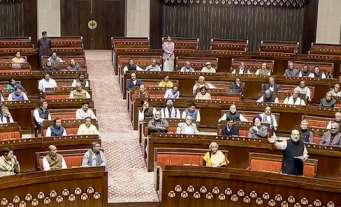Law of numbers: On the winter session and a low in India’s parliamentary democracy
The government should not use its majority to rush through legislation
The 18-day winter session of Parliament that was adjourned sine-die on December 21 marked a new low in India’s parliamentary democracy as the ruling Bharatiya Janata Party refused to engage with the Opposition, evaded executive accountability and passed a battery of Bills with far-reaching consequences for the country while a majority of the Opposition members remained suspended . In the final count, a total of 146 Members of Parliament (MP) from the Opposition bloc were suspended — 46 of the Rajya Sabha, and 100 of the Lok Sabha, as they clamoured for a statement by Union Home Minister Amit Shah on a breach of security that involved protesters gaining entry into the chamber of the Lok Sabha on December 13. The rift lingers , as Leader of Opposition in the Rajya Sabha Mallikarjun Kharge has written to Vice-President of India and Rajya Sabha Chairman Jagdeep Dhankhar, terming the suspension of Opposition MP as “ predetermined and premeditated ” by the government. The absence of any application of mind was evident , Mr. Kharge has written, recalling that an MP who was not even present in the Lok Sabha, was among those suspended. The Chairs of both the Houses could not ensure smooth conduct of the session. Attempts made by Mr. Dhankhar and Lok Sabha Speaker Om Birla lacked the requisite imprimatur of impartiality .
It was in the absence of a majority of the Opposition members that the government passed new laws that rewrite the criminal code of the country, regulation of telecommunication and the appointment of the Election Commission of India. The common feature of these laws is an unprecedented increase in the power of the executive, and it is not a coincidence that they were passed without a meaningful parliamentary debate that took on board conflicting views. The government refused even the Opposition demand for a statement on the security breach, in a show of obstinacy that equates numerical majority with logical and moral infallibility . The government has blamed the Opposition for bringing the suspensions upon itself, and this position has been echoed by the Speaker and the Chairman. The case of the alleged mimicry of Mr. Dhankhar by an Opposition MP was a distraction that was convenient for the ruling party. Mr. Dhankhar himself told the Rajya Sabha that the alleged mimicry was an insult to his community, a dismaying correlation to be made by anyone, let alone a legal luminary such as himself. It is another matter whether the Opposition should have invested so much time and effort in asking for a debate on the security breach by a few misguided youths. The effect, if not the objective, of it all was to derail parliamentary functioning and obtain a free-pass for the executive.

-
Unprecedented (adjective) – Unparalleled, Unmatched, Novel, Unique, Extraordinary
अभूतपूर्व
-
Rush through (phrasal verb) – Expedite, hasten, accelerate, speed up, hurry
जल्दी करना
-
Legislation (noun) – Law-making, enactment, statute, act, regulation
कानून निर्माण
-
Adjourn (verb) – Postpone, suspend, delay, defer, put off
स्थगित करना
-
Ruling (adjective) – Governing, dominant, controlling, prevailing, authoritative
सत्तारूढ़
-
Evade (verb) – Avoid, escape, elude, dodge, shirk
से बचना
-
Executive (adjective) – Managerial, directorial, administrative, supervisory, controlling
कार्यकारी
-
Accountability (noun) – Responsibility, answerability, liability, obligation, duty
जवाबदेही
-
A battery of (noun) – A series of, a collection of, a group of, a range of, an array of
एक श्रृंखला
-
Far-reaching (adjective) – Extensive, broad, widespread, significant, profound
व्यापक
-
Suspended (adjective) – Halted, paused, discontinued, stopped, interrupted
निलंबित
-
Clamour (verb) – Shout, yell, scream, demand loudly, outcry
शोर मचाना
-
Breach (noun) – Violation, infringement, breaking, contravention, transgression
उल्लंघन
-
Rift (noun) – Split, division, break, schism, separation
दरार
-
Linger (verb) – Remain, stay, persist, loiter, dawdle
मंडराना, ठहरा रहना
-
Term (verb) – Designate, call, name, label, refer to
नाम देना
-
Suspension (noun) – Postponement, delay, stoppage, interruption, halt
निलंबन
-
Predetermined (adjective) – Prearranged, preplanned, preset, foreordained, predestined
पूर्व निर्धारित
-
Premeditated (adjective) – Planned, intentional, deliberate, calculated, conscious
पूर्वचिंतित
-
Evident (adjective) – Obvious, apparent, clear, manifest, plain
स्पष्ट
-
Recall (verb) – Remember, recollect, reminisce, retrieve, bring to mind
याद करना
-
Requisite (adjective) – Required, necessary, essential, needed, obligatory
आवश्यक
-
Imprimatur (noun) – Approval, endorsement, sanction, authorization, consent
अनुमति
-
Impartiality (noun) – Neutrality, fairness, objectivity, detachment, unbiasedness
निष्पक्षता
-
Code (noun) – System, rules, regulations, guidelines, principles
नियम संहिता
-
Coincidence (noun) – Chance, accident, serendipity, fluke, happenstance
संयोग
-
Take on board (phrase) – Consider, accept, acknowledge, incorporate, adopt
स्वीकार करना
-
Obstinacy (noun) – Stubbornness, inflexibility, intransigence, rigidity, doggedness
हठ
-
Equate (verb) – Compare, liken, parallel, associate, correlate
बराबरी करना
-
Infallibility (noun) – Perfection, faultlessness, impeccability, flawlessness, perfection
अचूकता
-
Echo (verb) – Repeat, reflect, resound, mimic, reiterate
गूँजना
-
Alleged (adjective) – Claimed, asserted, supposed, purported, reported
कथित
-
Mimicry (noun) – Imitation, impersonation, replication, simulation, copying
नक़ल
-
Dismaying (adjective) – Alarming, troubling, disturbing, upsetting, disheartening
निराशाजनक
-
Correlation (noun) – Association, connection, relation, link, affinity
सहसंबंध
-
Let alone (phrase) – Not to mention, much less, to say nothing of, even less, not to speak of
छोड़िए ये तो
-
Luminary (noun) – a person who inspires or influences others, especially one prominent in a particular sphere.
प्रभावशाली व्यक्ति
-
Derail (verb) – Disrupt, throw off, deviate, hinder, obstruct
बाधित करना
-
Functioning (noun) – Operation, working, performance, activity, action
कार्यप्रणाली
-
Sine die (phrase) – for a period of time with no fixed end
अनिश्चित काल के लिए
-
Application (noun) – Use,
प्रयोग
-
Free pass (noun) – Exemption, privilege, immunity, license, carte blanche
छूट